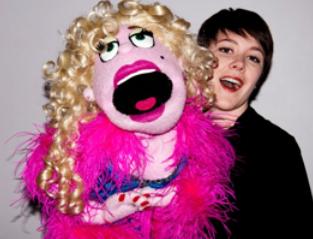When the puppet-based Avenue Q beat the far splashier Wicked for the 2004 Tony Award for Best Musical, it was a remarkable upset. And it remains an impressive feat, given that Wicked is the superior musical in almost every regard.
Yet the two shows stand as worthy counterpoints to each other, if only for their respective closing numbers, which are directly contrary in both title and message: where Wicked ends with “For Good,” an ode to permanence, Avenue Q goes out on “For Now.” And it’s the latter song, a tribute to the transience of life, that is ultimately more moving, insightful and genuine.
“For now, we’re healthy / For now, we’re employed / For now, we’re happy / If not overjoyed,” the song affirms. A strong production of Avenue Q is one that can wring the proper emotion and wisdom out of what on the surface appears to be a straightforward and obvious sentiment.
The Lower Ossington Theatre (LOT) rendition of the show achieves this and even exceeds the resonance of the original production. What was previously swallowed up in the Elgin Theatre, when Dancap toured it here in 2008, now has strokes of humanity and urgency that are amplified by the LOT’s comparatively intimate space. (The venue seats 150 or so, to the Elgin’s 1,561; on Broadway, the show ran for six years at the 800-seat John Golden Theater.)
The eight-person show is far stronger on this smaller scale, allowing the nuance and precision of the puppetry to carry the weight that it should.
LOT’s production uses a set of Rick Lyon’s puppets leased from the original, which immediately establishes a degree of comfort and signals that director Seanna Kennedy isn’t interested in reinventing or reinterpreting the piece so much as reproducing the earlier version, just humbler. Indeed, Kennedy’s staging is a faithful recreation on a fraction of the budget. This is bothersome only when it comes to the show’s brief video interludes, which aren’t as crisp and as polished as they might be; otherwise, the original’s occasional flourishes of spectacle are hardly missed at all.
Typically and accurately described as Sesame Street for grownups, Avenue Q could also be viewed as Rent without AIDS: it follows a group of 20- and 30-somethings struggling to find meaning and get on with life while living in a tight-knit, off-the-beaten-path Manhattan neighbourhood.
The same producers, Kevin McCollum and Jeffrey Seller, brought both shows to Broadway, and they later completed the trilogy with 2008’s In the Heights. (Dancap brings In the Heights, about New York’s Washington Heights neighbourhood, to the Toronto Centre for the Arts starting next week). Though considerably less gritty and more heartwarming than Rent, Avenue Q shares its faith in, and despair over, urbanism. The same metropolitan landscape that overwhelms and oppresses with its gargantuan indifference can also serve as a source of salvation from itself, since somewhere within it is a pocket in which your particular life makes sense.
For some actors in Toronto, that space seems to be the Lower Ossington Theatre, where young, non-Equity performers get a shot to shine.
Avenue Q‘s cast is terrific, led by Kira Hall, as Kate Monster/Lucy, and Adam Proulx, as Princeton/Rod. The latter pulls off an eerie imitation of John Tartaglia, who created the roles. But he also reveals closeted investment banker Rod (who is a puppet) to be the most thoroughly sketched character in the show and turns him into the one for whom we root the most. His coming out serves as the most touching of the show’s several arcs — all of which culminate in the above-noted anthem, which is as satisfying as a song about dissatisfaction can be.
It’s one thing to see a great production of a musical. But it’s even more gratifying to see a great production of a musical that you hadn’t even realized could be great. And it’s a simple tweak of two words that finally does it: “Rob Ford,” we’re reminded, is only for now.

 Why you can trust Xtra
Why you can trust Xtra


